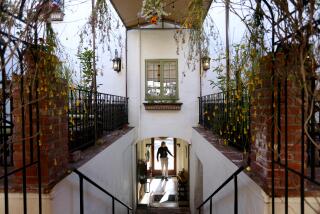Mistake in 1920s Presents Ventura Councilman With Dilemma in 1987
- Share via
As a retired civil engineer, Councilman John McWherter did not raise any eyebrows when he designed and built a customized carport for his Ventura hillside home two years ago.
It was only when the 72-year-old councilman discovered last week that he had unwittingly built the garage on city property that events came to seem more peculiar.
In a perplexing case of conflict of interest, McWherter may find himself forced to give up the council seat he won in the Nov. 3 election or destroy the carport he designed especially for his 21-foot-long Titan Class A recreational vehicle.
“It’s quite a sticky thing,” he said. “But I don’t intend to resign from the City Council. The alternative as I know it right now is to tear the thing down.”
At the root of McWherter’s problem is a state ethics code that prohibits elected officials from entering into contracts with the governments that they represent.
The result is that the 14-year council veteran cannot buy the land his carport rests on, or even receive it as a gift from the city.
To resolve the predicament, both McWherter and the City of Ventura were forced last week to hire attorneys, as neither could be properly represented through the city attorney’s office.
“You sort of wonder who your client is in a situation like this,” Chief Assistant City Atty. Mike Dougherty said, adding that lawyers on both sides are still discussing solutions. “We bowed out real quick.”
Questions about the property were raised in October, when a city crew surveying the adjacent parcel discovered that Mint Lane, which leads directly into McWherter’s garage, was about 12 feet north of where it should have been, according to city maps.
McWherter, who bought his three-bedroom home with its panoramic view in 1966, thought the surveyors had made a mistake and asked the city to remeasure the boundaries. When that work was completed Nov. 18, it became clear that Mint Lane had been laid down improperly when the land was subdivided in the early 1920s.
As a result, neither the people who constructed the home in 1959 nor McWherter, who erected the carport in 1985, had any reason to believe that they were building on anything but their own property.
“I was just as surprised as anybody,” said McWherter, who called a news conference last week to reveal the dilemma. “I didn’t want anybody to think I was trying to get away with anything.”
The only remotely applicable legal precedent, McWherter said, suggests a harsh remedy.
In 1985, the state Supreme Court ruled that an Albany, Calif., city councilman had acted improperly when he sold a one-acre parcel for $258,000 to a developer, who in turn deeded it to the city for use as a park.
The developer’s gift to the city did not stem solely from philanthropic sentiments, however. He had been required by the council to donate the parkland in return for the city’s approval of a 2,500-unit condominium project he wanted to build on adjacent land.
Hubert F. Call, who had retired from the council nine years before the court ruling, was admonished for trying to “serve two masters” and ordered to pay the city $470,000--the price he received for the land and 7% interest dating back to the year of the sale, 1973.
“That was the only precedent my attorney could find,” McWherter said. “But it’s not like mine. I don’t see how it would apply to my case.”
More to Read
Sign up for Essential California
The most important California stories and recommendations in your inbox every morning.
You may occasionally receive promotional content from the Los Angeles Times.













